- Home
- Joelle Charbonneau
Verify Page 4
Verify Read online
Page 4
“She used to, and when I asked she did, but my dad isn’t an artist. Mom didn’t want him to feel left out of the conversation, so she tried to make sure we talked about things we all enjoyed.”
He studies me with a sad smile. “Well, I know how your father feels.” He looks down at the tablet in his hand one more time, then stands and holds it out to me. “Thank you for coming in to show me your work. Marcus Webster is right. You have talent. I’m sorry you couldn’t get your application submitted in the typical manner, but I can promise we will consider your work as we make our final choices for this class. We have your information, and if you’re chosen you’ll be hearing from us soon.”
Just like that, I’m dismissed. There is no time to ask about the last project my mother worked on or if her team finished it, because once I take the tablet, he is walking me to the door, talking all the while. He wishes me luck in my finals at school as he escorts me down the empty hallway and tells me to give his best to my father. He pushes the button on the elevator and within seconds the doors open.
“Keep up the good work, Merriel,” he says as I step inside.
The elevator doors close. Disappointment settles in my chest. My hand feels heavy as I push the lobby button. As the elevator starts to move, I hit the number three, and when the doors open I feel my mother beside me as I start down the hall. If anyone asks what I’m doing here, I will just tell them I want to take the atrium stairs on my way out.
The design has changed since the last time I was here. Now instead of vibrant walls of lavender and blue, swirling ribbons of color snake along a background of yellow. Screens are scattered along the walls, all muted but tuned to various programs. One displays a report on the weather—sunny and warmer with no rain in today’s forecast. On the second, a broadcast of the current president addressing a group of smiling workers. Two others flip through slides of a handful of upcoming projects—like a park with an arching, waterfall-like fountain and a new apartment complex in rose and white stone.
An unfamiliar blonde dressed in a bright green top and tight purple pants smiles at me as she ducks into a workroom to the left. A burst of laughter sounds from inside the workroom as I pass. People are standing around a large square table with a model of something in the center of it. I don’t recognize anyone in the meeting space, and there aren’t any familiar faces in the next, but I do spot one person I know in the workroom not far from the stairs.
Kacee Anderson’s back is to me as she draws on a whiteboard. She’s dressed in all black and taps her foot to old rock music that is pumped through the room’s speakers. Her dark hair is pulled into a tight ponytail that sways as she works. Several other artists are working at the table or on graphic-design tablets along the wall.
Mrs. Anderson turns. I hover in the doorway and start to step forward as her eyes widen in recognition. But a small shake of her head stops me in my tracks and she turns back toward her project as if she never saw me at all.
For the second time today, the sting of rejection pricks deep into my heart. Still, I wait for several more seconds, hoping she will look back at me. When she doesn’t, I hurry toward the staircase at the end of the hall. I blink away the tears I refuse to let fall, keep my head down, and make my way to the atrium. Someone bumps me. I grab hold of my tablet to keep it from crashing to the ground and walk on—through the atrium, past the elevators and the security guard, until finally I stand in the sunshine outside the gold doors and am no longer able to control the tears that fall.
Disappointment floods through me. No matter how hard I try to hold on to her, my mother is slipping further and further away, as are the dreams I once had for my future.
I swipe at my cheek and look up and down the street for Isaac’s car. Isaac and Rose probably think I’m still discussing my work and that they have lots of time to kill before I need them to fetch me. And I’m glad. The short time spent in my meeting will give away how badly it went. Poor Rose. She worked so hard, and even enlisted her father—which had to have taken a lot of persuasion. It isn’t her fault that my talent fell short. She shouldn’t have to feel bad because she tried to help. So as much as I want to go home, I decide to walk around the block and get myself together before I call them to pick me up. It’s the least I can do for all that she has done for me.
The light changes, and I follow a bunch of businessmen across the street. I start to turn down the block when I notice a guy standing next to a light post who stops me in my tracks.
I think I know him.
No. I take a step forward and squint into the sunlight. We have never met. But I have seen him before. And when he turns and I see him slide a piece of paper into the front pocket of his pants, I realize where I know him from.
Black hooded sweatshirt. Rich brown skin. Close-cropped hair. Blue jeans that fit like a second skin and red shoelaces that snake up his black high-tops. It’s the guy I saw out the window of my math class, searching the bush after the cops arrested the magenta-haired man and carted him away.
But it can’t really be him. It has to be a coincidence. Still, after going months without seeing any paper, I can’t help thinking the two things are connected. Maybe that’s why I find myself trailing him when he turns and heads down La Salle Street toward the river. His stride is long and quick, and I have to jog a bit to keep up with him. He pauses to wait for the stoplight to change, and I get close enough to see his profile.
He’s younger than I originally thought. Isaac’s age. Maybe a year older. It’s hard to tell, but he’s closer to being a boy than a man.
The light changes. A group of giggling girls in their school uniforms race in front of me, pointing up at a giant screen on a building that in between news programs is featuring highlights from the “USA Proud” pop boy band currently touring all fifty-one states. I dodge around them and hurry forward, determined to keep the guy I’m following in view. He glances over his shoulder, and I try to pretend I’m just another tourist looking up at—what? I fix my eyes on a bronze statue of a man with his fist raised to the sky and wait several heartbeats before glancing back.
Damn. The black hoodie has gotten farther away.
Sweat drips down my neck as I zigzag through the people on the walkway. The boy crosses the street and heads for the bridge that leads over the river. I pick up my pace from a jog to a run.
A horn honks.
Fingers dig into my arm, and I’m yanked backward to the curb. I stumble and clutch my tablet as cars stream by.
A man in jogging shorts and a Chicago Cubs T-shirt helps me get my balance. “I’m sorry if I grabbed you too hard, but I didn’t want you to get hit.”
I stammer my thanks, then rise on my tiptoes and shift from side to side, catching glimpses of the sweatshirt as it gets farther and farther away. The light changes and I bolt forward. I push through people who are crossing the street in the opposite direction. My heart drums faster as I hurry toward the bridge, but when I get halfway across the expanse of the river I have no choice but to admit the obvious. The black sweatshirt and the boy who pocketed the paper have vanished.
How much time has passed in my wild-goose chase, I don’t know, but Rose and Isaac are going to be seriously worried and probably a whole lot annoyed if I don’t contact them soon.
Shaking my head, I turn and walk along the arching, rust-red iron bridge back to the side I came from, feeling foolish for having wasted so much time on . . . whatever that was. The light is red and I tap my foot, impatient for it to flash green. A seagull calls overhead. I look up and watch as the stretched white wings soar against the blue sky, then dip lower. The bird flies in front of the top of one of the large stone support posts that flank the end of each side of the bridge, and even though everyone else starts walking toward the crosswalk, I can’t move. My feet are like stone.
On the top of each of the supports is a set of windows. Above those windows is an artistic iron roof. And in the center of it is a design that I know almost as well as I know my own
face. I should. I’ve looked at it every day for the last three months. The hard curves and dark shapes.
It’s an image out of one of my mother’s final paintings.
Three
What feels like an eternity passes before I can get home and assure myself I wasn’t imagining things.
When I climb into his car, Isaac is irritated my meeting took so long. He huffs and snaps at me to get in and doesn’t wait for me to fasten my seat belt before he hits the gas. Rose, however, is thrilled that Victor Beschloss talked with me for over an hour and wants to hear details.
“Did he love your portfolio? He must have, considering how long you guys talked. I knew you had nothing to worry about. Can I see what you showed him?”
Since the questions come in such rapid succession, there is no need to answer any other than the last. I bring up the portfolio images and put the tablet into Rose’s outstretched hands. She oohs and aahs and makes all sorts of comments about the subjects and the bright colors. I smile as if I am listening, but in my mind I’m picturing the series of small canvases leaning along the wall of Mom’s studio.
Isaac yells at another driver and steers the car onto a less congested street. Rose continues asking questions, seemingly unconcerned by the speed of her brother’s driving or the quick succession of accelerations and stops. Rose pauses after each of her next questions, so I have no choice but to focus and answer.
No, I don’t know when they will contact the people selected for the City Art Program.
Yes, I saw one of my mother’s colleagues, but I didn’t really have time to talk with her.
“Well, when you’re working in the program, you and she will have lots of time to talk,” Rose assures me as Isaac pulls the car to the curb in front of my house.
“No offense, Meri, but get out,” Isaac says. His sister smacks him on the shoulder and he glares. “I still have to change before I meet Dad.”
“I really appreciate you driving me, Isaac,” I say, pushing open the car door. “Tell your father thanks and I’m sorry I made you late.”
Rose yells that she’ll call me as the car zips away from the curb. I wait until it is out of sight before I race into the house and back to Mom’s studio. Could the picture really be the same as the design I saw today on the bridge?
I flip though the canvases leaning against the wall.
Air catches in my throat.
There. That picture is the same image that I saw today.
I pull up the photograph I snapped of the top of the bridge with my tablet, zoom in until just the sculpted onyx iron of the image is showing, and compare it with the one in front of me. One that I had once believed was an abstract floral.
The large round centers in the tablet photograph and the painting are identical. Both have three curved petals at the top. Neither has individual petals at the bottom. Instead there is just one rounded curve that spans from one side of the round center to the other.
This isn’t some strange thing my mother saw in a dream and worked on despite it being a waste of resources. This is an identical representation of a small piece of the city I never thought to look closely at before.
I grab the other paintings from their perches on the floor and set them up on easels around the room. Now that I understand the images aren’t abstract, I look at them with a fresh eye, searching for anything that appears familiar.
Yes. The last one in line has a hard, rust-red curve. That’s the same shape and color as the supports of the bridge from today. The La Salle Street Bridge. And I think the one with bluish stone-like texture and a curved bit of burnished bronze could be the edge of the podium and statue that I passed today while following the guy in the black sweatshirt.
My mind spins as I look from picture to picture—at the unfinished work that has haunted me since my mother’s death.
I don’t see any other part of the La Salle Street Bridge reflected in the rest of Mom’s other paintings. But I feel as if I might actually be getting closer to finally understanding. . . .
A door slams. Dad’s home. And when I glance at the clock I realize how long I have been staring at the pictures. Dad is later than normal. Much later.
When I walk into the kitchen, it is obvious as to why. My throat tightens. His gait is unsteady, and when he turns toward me the pink in his cheeks and the dull, glassy sheen across his eyes make it clear he has broken his promise . . . again.
Whatever he sees on my face causes his tentative smile to fade and his shoulders to slump. “Meri . . .” He takes a step forward. “I saw a woman in the lobby at work who looked like your mother. The others invited me to get a drink and . . .”
His voice trails off. His eyes search my face, begging for forgiveness.
I want to scream.
I want to scream and yell and tell him that he wasn’t the only one who lost Mom. I lost her, too. And every day that he drinks I lose him. I need him. He’s all I have left. And he doesn’t seem to care.
But I choke back the words bubbling to break free. I’ve said it all before. Dozens and dozens of times and nothing changes. He apologizes and promises to do better, and even though I don’t believe him, a part of me desperately wants to.
A part of me still hopes, and I’m angry that I do.
“Go change,” I force myself to say. “I’ll make something for us to eat.”
He crosses to me with a sad smile. “I promise tomorrow will be better, Meri.” He pats my shoulder. I stand still as a statue as he passes by. When I hear footsteps on the stairs, I swallow the bitter taste in my mouth, go to the pantry, and take out two cans of tomato soup. I empty them into a pan and am grabbing stuff to make grilled cheese when I hear something thud upstairs.
That’s when the frustration and anger and hurt finally bubble over.
There are no tears. I’m too angry for tears, which is good because tears never help. I dump the bread on the counter, turn off the stove, grab my father’s keys off the table, and head out to the garage. It takes me no time at all to find the small bottle of vodka he has stashed in his glove compartment and the larger bottle still in its bag in the trunk. Before I can think too hard about what I am doing, I empty both bottles onto the ground, then throw them into the recycling container. The shattering of glass echoes in the night like the screams that I keep caged inside.
Will getting rid of the bottles change anything?
No. He’ll just buy more. But when he finds them missing or sees the pieces of broken glass in the recycling container, he’ll know I was the one who took them. Maybe that will make him wait a day or two before going to the store for more.
When he finally comes downstairs, I put food on the table and feign hunger. Dad makes a point of eating the soup and the grilled cheese with enthusiasm and asks if I am ready for my finals tomorrow.
“I need to spend some time looking over my geometry notes,” I admit as I dump the last quarter of my sandwich in the garbage and place my plate and bowl in the sink.
“Do you want me to go over them with you?” he asks. “I’m good with numbers.”
I turn back toward him. For a minute Dad looks at me like he used to before the accident. Interested. Excited at the prospect of helping me. He always said that math was the greatest thing in the world.
When I was little he used to tease Mom when she struggled with a design. He’d say she should have become an accountant because math was dependable in the execution. There was no worry over choices. The numbers just added up.
I know he was hoping, for a while, that I’d follow in his footsteps.
Dad was the one who saw the step in front of him. Mom had dreamed of the steps people had yet to take. I can’t help but wonder if things would be better between us now if I were more like him.
I shrug off Dad’s offer. “I just need to read over some of the proofs one more time. That’s easier to do alone.”
And really, sitting in the living room with him talking about numbers would feel normal. There’s nothing n
ormal about either one of us, and I’m not up to pretending.
“Well,” he says with a sigh, “I’ll be just a room away if you need me.”
If only that were true, I think as he brings his plate to the counter. We do the dishes in silence. There used to be laughter in the kitchen. Dad is probably thinking the same as we dry the plates and put them away. The quiet is painful, and as much as I want to hide in my room alone, I find myself suddenly saying, “I guess . . . we could go over my notes together, if you really want to.”
The delight on my dad’s face rubs me the wrong way—but I made the offer. So I get my school tablet, load my textbook and review sheet, and come back into the living room, where Dad is waiting for me.
It’s awkward at first. After months of doing everything on my own, I’m defensive when I hand Dad my tablet. But he finds a bunch of ways to compliment me on things that I understand and finally gets around to talking about the stuff I’m struggling with.
After we get through a few problems, I find myself leaning closer as he scribbles on his tablet. The jokes he makes about congruency and tangents and chords are lame but still make me laugh. By the time we get through all the review questions, I’m feeling more confident about getting a decent grade on tomorrow’s exam and Dad is smiling in a way I haven’t seen in months. Instead of being colored by dull blues and grays, he’s now shining with vibrant yellow. He’s not pretending to be happy. He really is.
“So is there anything else you need your old man’s help with?” he asks, picking up my tablet. His finger punches one of the icons and suddenly the image on the screen changes from mathematical problems to my mother’s half-finished painting.
I watch it happen—like rain falling on a chalk sidewalk drawing. The melting of beauty into nothingness. The teasing glint in his eye disappears, and he leans back as if worried the image will jump out and bite him for real instead of just nipping at his heart. “Are you still thinking about that picture?” he asks.
“Not really,” I lie. I take the tablet from him and tap the screen so the math book replaces Mom’s painting. “Do you think we can go over one other thing?” I ask, trying to bring the brightness back into the room. “The cone problems are still giving me trouble.”

 Forbidden Fruit
Forbidden Fruit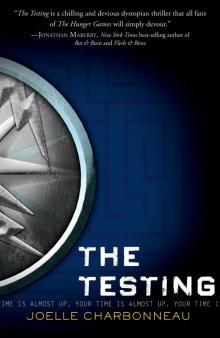 The Testing
The Testing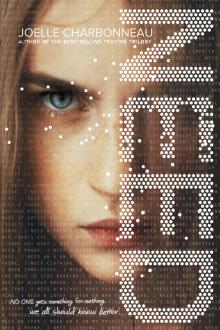 Need
Need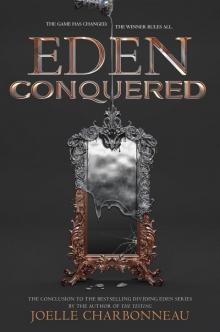 Eden Conquered
Eden Conquered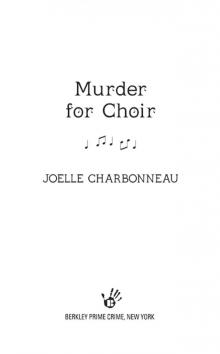 Murder for Choir
Murder for Choir Into the Garden
Into the Garden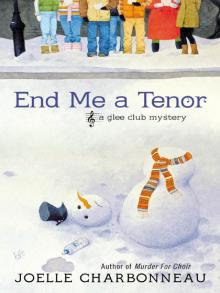 End Me a Tenor
End Me a Tenor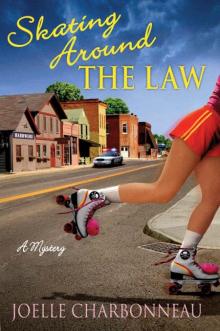 Skating Around the Law
Skating Around the Law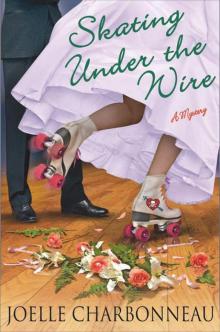 Skating Under the Wire
Skating Under the Wire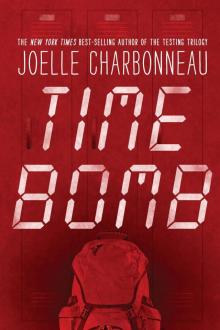 Time Bomb
Time Bomb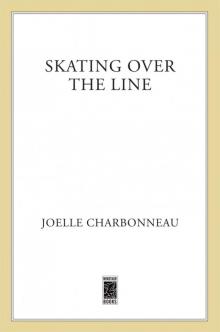 Skating Over the Line
Skating Over the Line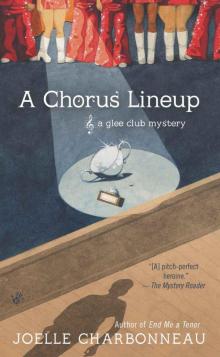 A Chorus Line-Up
A Chorus Line-Up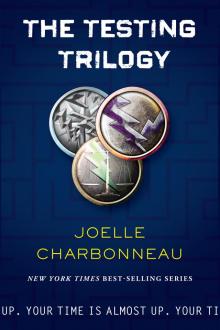 The Testing Trilogy
The Testing Trilogy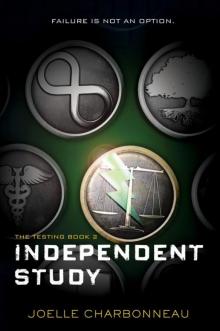 Independent Study
Independent Study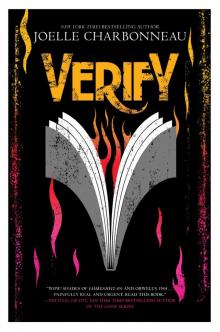 Verify
Verify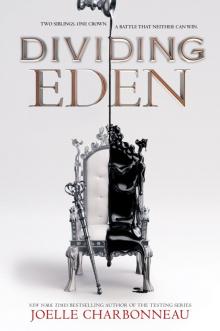 Dividing Eden
Dividing Eden Graduation Day
Graduation Day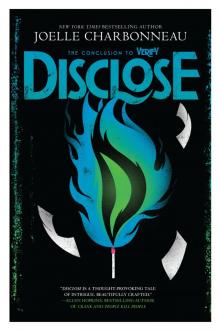 Disclose
Disclose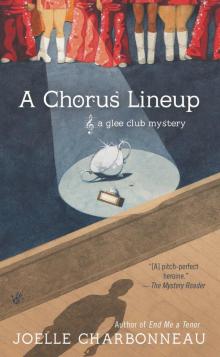 A Chorus Lineup
A Chorus Lineup